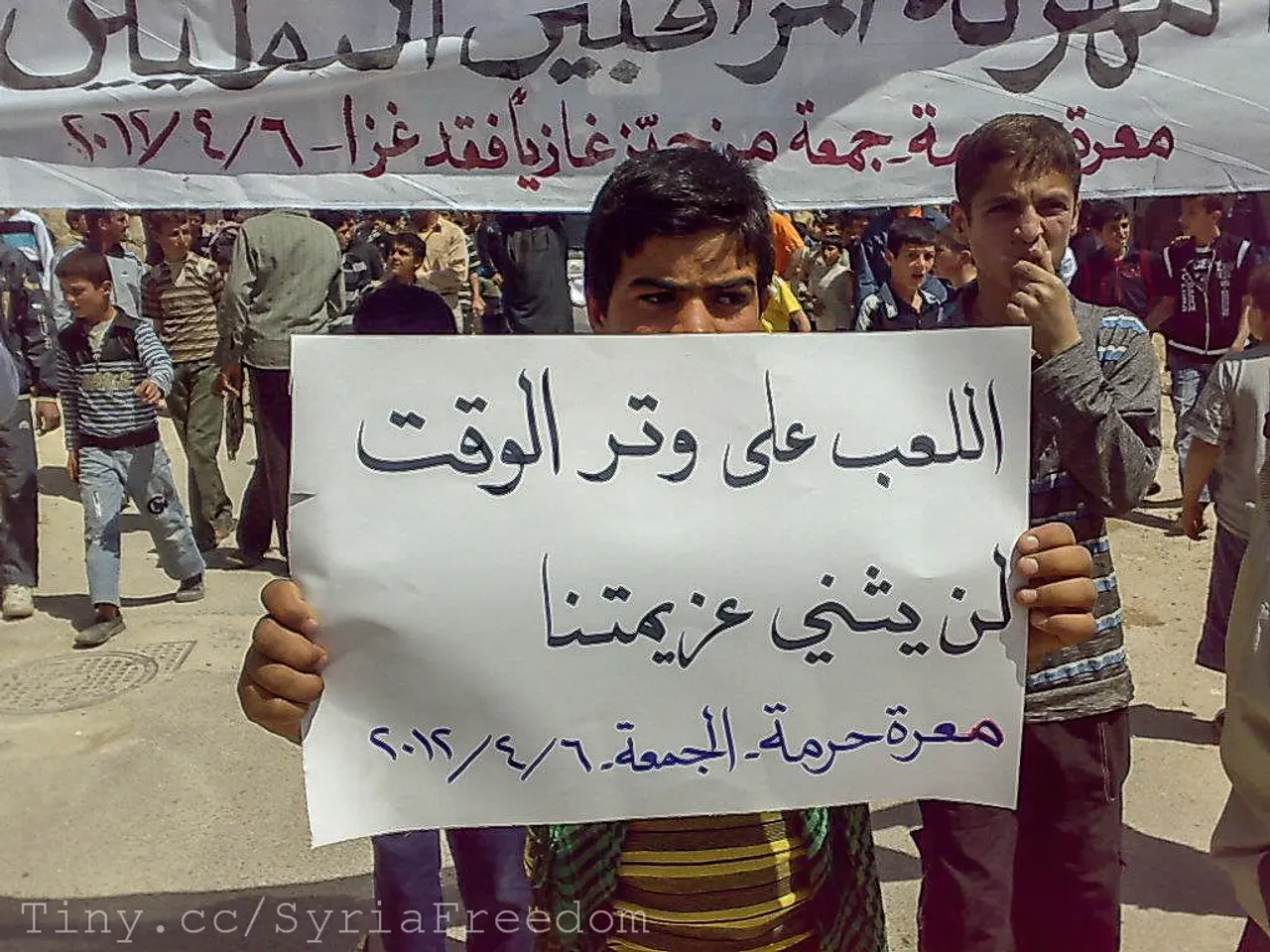Hamas allegedly didn't show enthusiasm for the proposed Gaza deal, causing its collapse, according to Trump's statements during the breakdown of negotiations.
Israel and the United States are exploring various alternative options to bring hostages home from Gaza and end Hamas's control, following the collapse of ceasefire talks and stalled negotiations.
One proposed solution under discussion is a two-phase deal involving a 60-day ceasefire. During this period, half of the hostages could be released in stages, each exchange involving a large number of Palestinian prisoners held by Israel. This deal would include the release of about 8-10 live hostages and the bodies of around 18 killed hostages. Negotiations would continue towards a permanent resolution, including Israel’s demands such as the IDF maintaining border security and expelling Hamas leaders to effect regime change, likely replacing Hamas with a consortium of Arab countries like Egypt and the UAE.
However, the talks have stalled, with the U.S. withdrawing its negotiating team from Doha due to Hamas's perceived lack of good faith. Israel’s Prime Minister Netanyahu has confirmed that they are now weighing “alternative options” beyond negotiations with Hamas to bring hostages home and achieve lasting regional peace, though the exact nature of these alternatives has not been publicly specified.
Criticism and concerns surrounding these options include:
- Hostage families and the Israeli opposition argue that negotiation with Hamas remains the only viable way to secure hostages' release. They worry about Hamas having the power to select which hostages to release during potential deals, causing anxiety about who gets freed.
- Netanyahu conveyed that Hamas would likely pick the hostages released during a ceasefire, which raises concerns over fairness and transparency. Intelligence information is being used to determine release priorities, but families fear some captives might be left behind or treated unequally.
- U.S. officials express doubt about Hamas’s sincerity, with the U.S. Special Envoy Steve Witkoff stating that Hamas "does not appear to be coordinated or acting in good faith."
- Humanitarian concerns persist as violence pauses only in limited Gaza areas to allow aid distribution amid worsening hunger and suffering. Israel coordinates with UN and international organizations to direct food and medicine supplies, while also intercepting shipments it views as illegal, further complicating the humanitarian situation.
As Israel and the U.S. balance the urgency of rescuing hostages, ending Hamas’s rule, and addressing humanitarian needs, they face major challenges due to Hamas's intransigence, hostage families’ anxiety, and regional security considerations. The alternatives, including ceasefire-based hostage exchanges and possible non-negotiated measures, remain under deliberation but have yet to produce a clear path forward.
Meanwhile, air drops of aid are set to resume in the upcoming days, managed by the UAE and Jordan. However, numerous Palestinians have been killed by falling crates, in stampedes, or drowned trying to retrieve packages from the sea.
Violence continues in Gaza, with the Gaza's civil defense agency reporting that Israeli military operations killed at least 23 people on Friday across the Palestinian territory, with another five killed in an overnight air strike. Of the 251 hostages taken during the attack, 49 are still being held in Gaza, including 27 the Israeli military says are dead.
Mediators Qatar and Egypt have stated that the talks could still resume and are vowing to carry on with intensive efforts to secure an elusive breakthrough. Senior Hamas official Bassem Naim accused U.S. Special Envoy Steve Witkoff of distorting the reality of the talks and walking back on agreements.
[1] Netanyahu, B. (2022, October 1). Interview with CNN. [2] Witkoff, S. (2022, October 5). Press Conference. [3] Israeli Opposition Leader (2022, October 7). Press Conference. [4] U.N. Secretary-General (2022, October 10). Press Conference.
- Tensions continue in Gaza, with the Israeli military and Hamas at an impasse, while Israel and the United States pursue various alternative options to secure the release of hostages and end Hamas's control over the region.
- The international community, including France, is closely watching the developments in the Middle East, with concerns about the welfare of hostages and the humanitarian situation in Gaza.
- Science and health organizations are raising awareness about the importance of mental health, nutrition, and general wellness among the hostages and the broader population in Gaza, amid the ongoing violence and conflicts.
- Human rights groups are calling for justice and accountability in the wake of violent incidents, such as the deaths of civilians due to falling aid crates, stampedes, and drownings in efforts to retrieve packages from the sea.
- Politics and negotiations remain central to resolving the crisis, with key players like Egypt, the UAE, and Qatar actively involved in mediating talks between Israel and Hamas.
- Amid this complex saga of war and conflicts, France is urging all parties to prioritize diplomatic solutions, adhere to international law, and strive for peaceful coexistence in the region.
- As tensions persist, there is growing consensus among experts, diplomats, and concerned citizens alike that lasting regional peace is achievable, only if all involved parties are committed to upholding the principles of human rights, international health, and more for the betterment of all.




